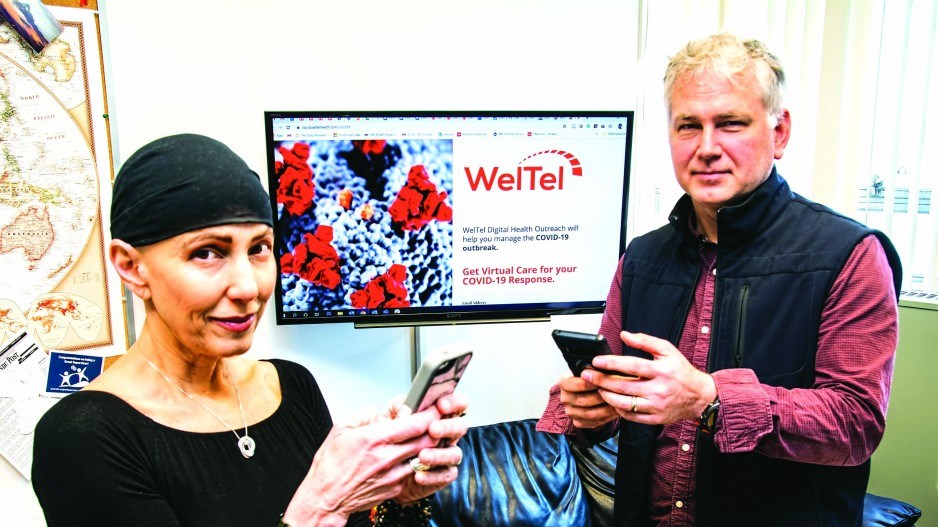COVID-19 was still 15 years away from emerging as a global threat when Richard Lester travelled to Kenya in 2005 to work on the HIV vaccine.
But it was then that inspiration hit for what would become WelTel Inc.’s wellness-check platform as the infectious-diseases physician found significant numbers of patients were being lost in the system during the follow-up process.
Mobile phones capable of texting with doctors to track health outcomes were ubiquitous in Kenya, so Lester started a controlled trial with the results published in the Lancet medical journal in 2010.
“We found that patients supported by text-messaging communications were more likely to have a good adherence to their medication and have a good treatment outcome,” said WelTel’s co-founder, a doctor at Vancouver Coastal Health.
Flash forward to 2020 and WelTel’s mobile messaging app is being deployed at Vancouver General Hospital for a six-month pilot on up to 800 patients to prevent unnecessary returns to the emergency rooms.
Health-care providers can use SMS technology to check in on patients and follow up via phone or video chat if the patients aren’t feeling well. The platform also allows users to set appointments and lab test reminders, as well as broadcast public health messages.
“Suddenly I’m reading some of our public health communications on the novel coronavirus and the importance of home isolation... and it just seemed like a perfect fit,” said Lester, WelTel’s chief science officer.
“We’re all ready to have a communications hub for patients in the community setting to connect with their care providers. So in public health there’s suddenly a great demand to be able to keep patients well supported. But we have to avoid that physical contact because we know the coronavirus is spread through physical contact.”
WelTel is in the midst of reaching out to public health agencies to persuade them to use its technology to curb COVID-19’s spread.
“We can deploy in a number of minutes to an hour,” CEO Gabby Serafini said, adding the company already has tapped a number of paying clients as it shifts from research mode to commercialization.
While fears over COVID-19 are triggering market plunges, cancelled events and panic among consumers, WelTel is among a segment of B.C. tech firms poised to put their digital wares to the test amid the outbreak rather than tighten their belts.
Vancouver-based Well Health Technologies Corp. has partnered with McMaster University and the Public Health Agency of Canada (PHAC) to help monitor the spread of influenza and flu-like illnesses within a community. The flu automated surveillance tool (FAST) helps collect anonymized data in real time from doctors as they determine if patients are exhibiting flu-like symptoms.
From there PHAC will be able to respond quicker to manage the risk of outbreaks.
Well Health Technologies CEO Hamed Shahbazi, whose company is configuring FAST for the electronic medical records used in this partnership, said the tool could easily be applied to collect questions relevant to COVID-19 without putting any additional strain on resources.
“There’s no cost to doctors. There’s no cost to clinics. It’s really something we’re doing to be able to get that data back to PHAC,” he said, referring to the collection of data on flu-like symptoms.
“A digitized and automated system like this that provides a more real-time perspective on these systems is really, really helpful because it then allows authorities and public health officials in being proactive in taking steps to either prevent or contain these outbreaks.”
FAST will be deployed in the coming weeks in Ontario with plans for launch beyond that province in 2021.
Outside the health-technology arena, Vancouver’s Digital Media Academy has developed an online curriculum for coding that’s being used by students locked out of the classroom in Ningbo, China.
Another Vancouver-based company, GeoComply Solutions Inc., also expects business to remain steady amid the COVID-19 outbreak as it helps facilitate online streaming services and gambling.
GeoComply essentially enforces digital geographic borders to thwart, for example, Americans from placing online bets across state borders (a federal crime).
Its tools are also used by entertainment companies to ensure viewers aren’t using virtual private networks or proxies to watch streaming content otherwise not licensed for viewing in the region in which they live.
“[From] what I’ve just seen in our teams across the globe in our international offices, people are choosing to stay home, especially if they are feeling concerned or have someone vulnerable in their home. And therefore ... digital entertainment is what they’re turning to,” said GeoComply founder and chairperson Anna Sainsbury.
“They’re watching the news, they’re streaming television content and looking for entertainment and potentially games online.”
She added that GeoComply’s systems wouldn’t face anything beyond what it can handle as COVID-19 shifts habits in consuming entertainment. She likened the current activity to typical trends during winter months.
Click here for original story.



